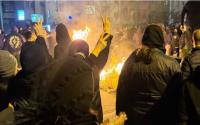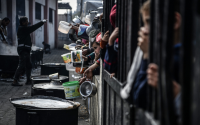Anti-terrorism is in danger of falling hostage to Sharon
The Guardian,14 December, 2001If there were such a thing as a radical Islamist headquarters, intent on a strategic response to reverses in Afghanistan, we would have to conclude that it is enjoying a degree of success. Palestinians and Israelis are in an even worse confrontation than before, with the secular Palestinian nationalists caught in a tightening vice between the Sharon government and the Islamist movements. Western countries slip nervously from one terror alert to the next. And now it looks as if war has been carried to yet another capital, with yesterday's suicide attack on the Indian parliament buildings. It only needs a bomb in Moscow or Beijing, perhaps planted by comrades of the Uighur al-Qaida men whose handover from Afghanistan China demanded this week, to round out a dark picture.
The tanks around Yasser Arafat's Ramallah office focus attention on the leader's plight, which is assumed to be that he is being forced to declare war on the Islamist movements. But the other old man, Ariel Sharon, may be hiding behind his reputation for unhinged belligerence his real plan of reducing the territories to a series of controllable slices ultimately supposed to be run, after cleaning up all the terrorists, by compliant local leaders.
The Palestinian analyst Khalil Shikaki, sitting in his rooms overlooking the Arafat compound, six months ago identified this option, based on what he called the worst kind of "Israeli orientalist thinking", as one which attracted Sharon. There may also be method to the madness of "targeted interceptions". The assassinations ensure, if that were needed, that Hamas and Islamic Jihad will mount operations which justify more and more Israeli incursions into Palestinian territory. And, even as they create new recruits for the extremist organisations, they are removing the limited cadre of experienced leaders. If this is the plan, then Yasser Arafat is indeed irrelevant to the Sharon government's purposes.
Whether Ariel Sharon has a plan or not, and even accepting that he is not solely to blame, the results are obscene. The suffering of Palestinians worsens by the day, hardly anyone escapes it, and it inevitably breeds a desire for vengeance. The suffering of Israelis, less universally experienced, is sharp enough. For them violence is an interruption in what is still on the surface a more or less affluent, comfortable and normal life, while for most Palestinians such a life hardly exists at all. That, of course, is no comfort for those Israelis who lose their loved ones.
Then there is the impact on attitudes throughout the Muslim world. How can anyone in Washington or anywhere else expect to win hearts and minds while a war of this kind goes on in the territories? Not the hearts and minds of those who are already committed but of those ready to listen?
What is happening can, some claim, be painted as a retreat punctuated by a few rearguard actions. Terrorists have been defeated in Afghanistan and are now being shown that they will not get their way in the territories, in Kashmir, or anywhere else. The big cancers are being hacked out, and the smaller growths will be identified and removed over the next few years. In Washington there are those who believe that the "demonstration effect" of American victory in Afghanistan will be profound. Arabs and other Muslims have registered American power and determination and it will change the way they see the world.
The trouble is that the attempt to create a shining tale of heroes and martyrs is a fundamental part of what is going on. Some of these enterprises do not need to be successful, in any ordinary military sense, to do what they are mainly intended to do. Israelis often saw themselves, or were accused by others, of "creating facts on the ground".
This kind of warfare, by contrast, while it aims eventually to undo those facts, is aimed for now at "creating facts in the mind", at changing the way in which Muslims interpret events. For that purpose blows against the enemy, including the killing of civilians, heroic failures, martyrdoms and last stands will serve very well. True, the speed with which the Taliban disintegrated under American bombs and with which the al-Qaida fighters are now disappearing into Pakistan does not quite fit that bill. But the past shows how easily the facts can be rearranged, particularly if the intended audience is inclined to disbelieve western statements, the accounts of western media and even, sometimes, the evidence of their own eyes and ears.
Establishing what degree, if any, there was of direction, common planning, or common purpose linking Kashmir with the West Bank, Somalia with Chechnya or al-Qaida with a range of other radical groups was recognised from the start as the most important of questions. To the extent that there were some connections, that had to be recognised. After all, the west looked the other way while an initially small extremist movement, basing itself in Afghanistan, radicalised three wars which had previously been mainly national conflicts, those in Afghanistan itself, in Kashmir and in Chechnya.
But the rub was that if the US and others, including the European countries, Russia, India and China, made too much of any links they would be doing Osama bin Laden's work for him. They would be consolidating diverse Muslim movements of protest, religious purification and violent opposition to non-Muslim rulers into something like the single uprising which he wanted, or at least creating a single drama in the minds of millions of already disturbed onlookers.
Far better to concentrate on what was local and unique, including possible solutions, than to lump everything together under the single label of "terrorism". What was needed, according to Jonathan Randal, the distinguished American journalist who has thought a great deal about the interaction between American policy and Middle Eastern societies, was akin to needlepoint, taking painstaking account of every difference in each country and situation.
Some common planning or inspiration, it might be guessed, links the al-Qaida rump with Kashmir and thus with Delhi. None, or very little, links it with events in the territories. Even where there may be some connections, an independent dynamic drives the different conflicts. But that they are joined in the world of images and dreams is indisputable. The campaign against terrorism, supposed to be conducted with skill and sensitivity, is in danger of becoming hostage to Ariel Sharon and his cruel and unworkable ideas about the relationship between Israelis and Palestinians.
It's true that there is no simple chain of blameworthy actions which led to this deterioration. But the US will be making a mistake which goes beyond Israel and the territories and will affect its wider purposes for the worse if it allows itself to be pulled into Sharon's slipstream.






